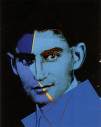 |
 |
|||



The Unknowable: Meditations on the Law
By Risa Peris
.

In A Message from the Emperor and Before the Law we understand explicitly that the law has been created to be both personal and inaccessible to the receiving subject. Both premises are contrary to the Western principle of the Rule of Law and both characters from the two stories become pitiable in the face of such gargantuan displays of power that only seek in denying knowledge rather than in bestowing. And yet, that does not stop the subject from imagining, as in A Message from the Emperor, that messages will eventually reach the subject against impossible odds or that eventually, as in Before the Law, admittance to the law will be suddenly granted if enough time has elapsed. The humanity in the subject is in the striving – the wanting, needing and effort to know the law. The frustration for the reader is when that striving is mocked and knowledge of the law, in whole, is denied.
I recall a conversation I had with a quantum physicist wherein we were comparing our educational training. “Physics,” he told me, “was an esoteric pursuit.” I agreed with that. “The law, however,” he pointed at me, “is pedantic.” I shook my head. “What?” He said. “So the law isn’t completely knowable? There are grand mysteries surrounding the law?” I thought about this. “If you ask me a legal question, I will probably say – it depends. The law is rarely yes or no or black and white.” He thought about this. “True. But that does not make the law unknowable. You could reach a decision or, at least an approximation of a decision, if you knew all the facts.”
In 1906, Franz Kafka graduated with a degree in law from the
Kafka produced no legal scholarship. His comments on the law are buried in his fiction. Nearly every piece of Kafka’s writing, from The Trial to In the Penal Colony, deal with unfortunate confrontations with power. The courts, far from being open and public, appear more like secret tribunals wherein the charges are never fully stated and the defense can never be fully mounted against those in power. At every turn, the subject is denied knowledge and hence the ability to ever fully vindicate himself.
I was reading A Message from the Emperor when I was watching the movie, Six Degrees of Separation. There is a moment in the movie when Stockard Channing’s character is in the Sistine Chapel while it is being restored. She is standing on a scaffold underneath God with his outstretched hand – that famous image where God and man just barely touch. The art restorer tells her to touch God’s hand. Stockard Channing’s character looks unsure. But the art restorer insists. He says, “slap God’s hand.” The woman finally shrugs her shoulders and reaches up and slaps God’s hand. Everyone laughs. The scene ends. For Kafka, ‘touching God’ is not that simple or carefree. Even if the message is personally for you – from God, the State, the Law – it is unlikely to reach you. However, as in A Message from the Emperor, you can “dream it up as evening falls”. But a message from the “empire’s capital, the center of the world” will not make it pass the area “flooded with the dregs of humanity.”
The Law is a torment in Kafka’s imagination. My quantum physicist friend was right. The Law is pedantic. Once known it unfolds in a formulaic manner. However, under the control of Kafka’s pen the Law became esoteric. The Law became unknowable and unreachable. Understanding the charges against one became as difficult as understanding the position of an electron in an orbital cloud. However, at issue does not seem to be the truth or veracity of the law or even our fallible interpretation of the law. In fact, the law is never presented for review in A Message from the Emperor and Before the Law so we do not know if the law is fair, just or wise. We do not know if our issue with the law is our misinterpretation of the law. But we do know that the law is unreachable. The pure text of the law will always be denied us.
What is unknowable about the law is not necessarily the law but the power that guards the law. We have shrouded the law in power not to protect the law but to give it importance. In Before the Law a simple man from the “country” asks to be admitted to the law. He is prevented entrance to the law by a large man in a fur coat whom Kafka describes as having Tartar characteristics. But through the gloom the man can see radiance pouring from the door of the Law. Even as the man nears death, the Law looks beautiful. The guard, the power surrounding the law, does not take pity on the man and continues to deny the man access to the law even upon the man’s death. Even more appalling, we learn that the law was meant only for the man and no one else. Thus, the power surrounding the law is not impersonal or indifferent. It deliberately flaunts its power to those it is meant for.
To Kafka, an agent of the law during the course of his life, what is esoteric about the law is not the law itself but the power that is essential for giving the law its status. A law cannot be without a power to grant its existence and supremacy. There must be a body or group of individuals that creates the law. In that creative power of law making there is a halo or a penumbra that encapsulates those attached to the law, which includes the enforcers and the punishers. One can hardly argue that in an orderly society (at least in a Western conception) there must be rules and adherence to rules. Citizens freely give over power to the law making body and those individuals attached to it.
We create an intentional demarcation between ourselves and the law for the sake of what we believe to be an orderly and just society. In Before the Law I recalled wanting to scream at the main character. I wanted him to attack the guard and storm the house of law. Instead, the man waited politely for the law. He was never invited to approach the law or ‘slap the hand’ of the law. He simply sat still until his eventual demise. The man psychologically could not challenge the law. It is no wonder that, for Kafka, the law was personal and seemed structured and worded as if meant for each individual since it addressed the psychological barriers and limitations of every person. The law would remain unknowable so long as the citizens for whom the law was created remained psychologically unchanged. The law would remain unknowable so long as we allow the penumbra of power to shield us from knowledge. The law makers, law enforcers and law punishers will be protected within their halo of power unless we can pierce their authority. One could easily see how the law is a torment in this scenario. Of course, one could also see how one’s mind is a far greater torment and barrier.

